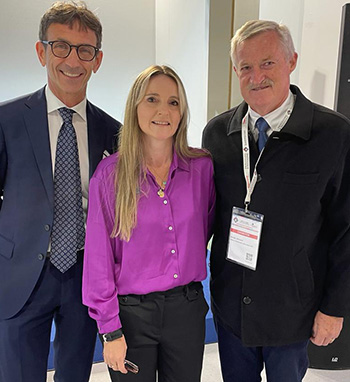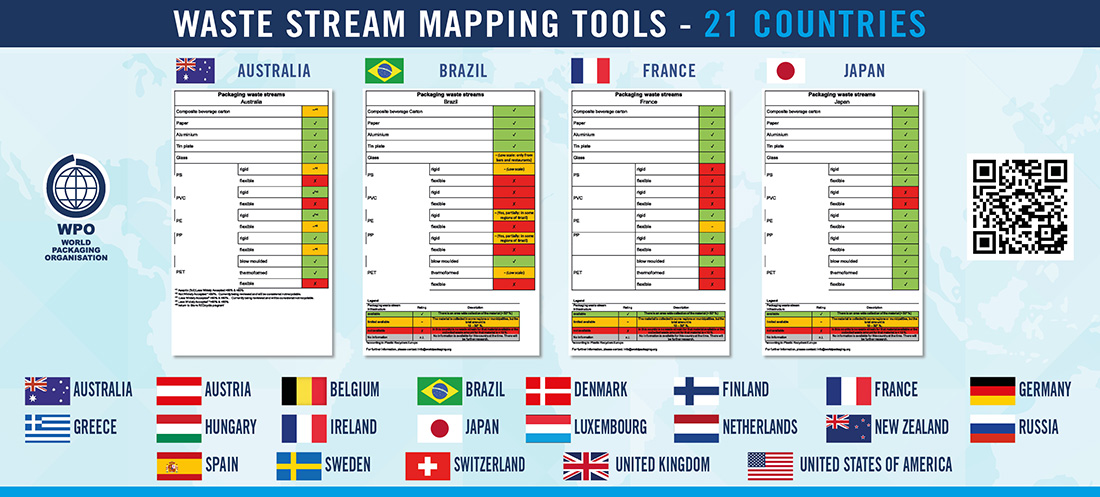The World Packaging Organisation (WPO), in conjunction with FH Campus Wien University of Applied Sciences, Austria, Circular Analytics and ECR Community, have launched the 21x countries ‘Waste Stream Mapping Guides’ as the second stage of the Global Packaging Design for Recycling Guide program. The countries contemplated are Australia, Austria, Belgium, Brazil, Denmark, Finland, France, Germany, Greece, Hungary, Ireland, Japan, Luxembourg, Netherlands, New Zealand, Russia, Spain, Sweden, Switzerland, United Kingdom and United States of America.
According to Ernst Krottendorfer, Co-Managing Partner of Circular Analytics, who was one of the key developers of the Global Packaging Design for Recycling Guide and the Waste Stream Mapping Tools, “design for recycling is part of a circular product design and represents an important basis for holistic sustainability assessment”.
“Accordingly, circularity means that the packaging is designed in such a way that the highest possible recycling of the materials in use can be achieved. The goals here are resource conservation, the longest possible service life, material-identical recycling (closed-loop recycling) or the use of renewable materials,” he said.
“Circular Design is only effective when the relevant collection, sorting and recycling streams exist. From the mapping of the Waste Streams we can better determine technically recyclable packaging types in countries across the world,” Mr Krottendorfer said.
 The WPO Vice President for Sustainability & Save Food, Nerida Kelton, added that “in order to be able to apply recyclable packaging design, a certain fundamental knowledge of sorting and recycling processes is necessary. Packaging must, therefore, be suitable for state-of-the-art sorting and recycling processes in addition to its basic functions (e.g., storage, transport, product protection, product presentation and convenience,”
The WPO Vice President for Sustainability & Save Food, Nerida Kelton, added that “in order to be able to apply recyclable packaging design, a certain fundamental knowledge of sorting and recycling processes is necessary. Packaging must, therefore, be suitable for state-of-the-art sorting and recycling processes in addition to its basic functions (e.g., storage, transport, product protection, product presentation and convenience,”
“The Waste Stream Mapping Guides are essential global decision-making tools that will enable anyone to access current information on technically recyclable packaging across the world. They will help those involved in the development of packaging to not only plan in accordance with regional technical recyclability, but to also improve the design at the start to meet the regional requirements, or limitations, for collection, sorting, recovery and recyclability. Using these tools at the start of an NPD process will also bring significant opportunities to eliminate non-recyclable packaging before it is placed on the market,” she said.
“The Waste Stream Mapping Guides also come with a ‘How to Use Guide’ for the Global Packaging Design for Recycling Guide so that they can be used hand-in-hand when packaging is being designed. These guides will also be extremely useful to assist companies who are exporting their products and are unsure as to what is technically recyclable, conditionally recyclable or non-recyclable in the country in which the product will be sold. This information will help them to meet the packaging design parameters for that country to ensure recyclability.” Mrs Kelton said.
The 21x Country Waste Stream Mapping Guides and the How to Use Guide are now available on the WPO website www.worldpackaging.org/wpo/45/
The project team is currently working on the next round of Country Waste Stream Mapping Guides, which will also be made available in 2022.
About WPO
World Packaging Organisation (WPO) is a non-profit, non-governmental, international
federation of packaging institutes, associations, federations and other interested parties including corporations and trade associations. Its mission is “Better quality of life through better packaging for more people”. WPO joins 53 different countries.
A key focus for the WPO in recent years is to ensure that every packaging designers and technologists across the globe has access to education and training. The purpose is to minimise unnecessary packaging and food waste, eliminate single use plastic and problematic materials, ensure that all packaging is recyclable and recoverable in the country it is sold in, and help guide packaging design to offer the lowest environmental footprint possible.
About Circular Analytics
Circular Analytics is a consulting firm specialised in Packaging Sustainability and Circular Packaging Design. The company helps clients to apply the principles of Circular Economy to restructure their packaging portfolio. Circular Analytics has developed a proprietary digital tool, The Packaging Cockpit, to analyse the circularity of packaging systems and to optimise the environmental impact of packaging.
About FH Campus Wien University of Applies Sciences
With over 8.000 students, at five locations in Vienna and six further cooperative study locations FH Campus Wien is the largest university of applied sciences in Austria. In the Departments Applied Nursing Science, Applied Life Sciences, Building and Design, Health Sciences, Social Work, Engineering and Administration, Economics, Security, Politics, FH Campus Wien offers more than 60 full-time and part-time degree programs and academic courses. R&D projects of the degree programs and external contract research are currently handled by nine subject-specific competence centres. The Campus Wien Academy of the University of Applied Sciences offers continuing education and training in the form of seminars, modules and certificate programs.
The team behind the Department of Packaging and Resource Management at FH Campus Wien University of Applied Sciences conducts research in the areas of sustainable packaging development and circular design, as well as methods for assessing the sustainability and safety of packaging.
About ECR Community
ECR Community is the global association for all ECR National organisations in the Retail & Consumer Product Group sector. It is a not for profit that provides a neutral platform to develop and share best practices among our network of ECR Nationals and their members. The purpose of the ECR Nationals is to bring together manufacturers, retailers, service providers and industry associations at a national level to share best practice information in areas that are mutually beneficial such as supply chain, category management, sustainability and digital transformation. A key focus area for the ECR Community is the circular economy, given the impact that this transition will have on retailers and manufacturers over the coming years.

